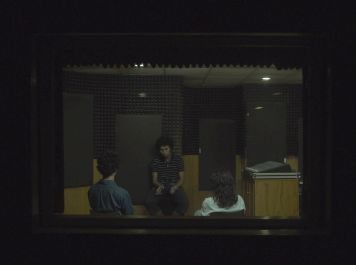Egypt / Poland, Visual Arts, 2016
Jasmina Metwaly
Philip Rizk
Since 2010, Jasmina Metwaly (b. 1982 in Warsaw) and Philip Rizk (b. 1982 in Limassol, Cyprus) have collaborated together on art projects, in addition to their individual practices as artists, filmmakers, and activists. After completing her studies in fine arts in Poland, Metwaly moved her life to Cairo in 2009. Rizk studied philosophy in Germany and the US, and Middle East Studies in Cairo, where was active mainly as a political blogger. Both are co-founders of the political-activist media collective Mosireen. Their collaborative work consists primarily of short videos filmed inside factories, during demonstrations, or strikes throughout Egypt, and documents the broad spectrum of social and political struggles there since the revolution and the fall of Mubarak in 2011.
In particular, they are interested in the situation of workers whose existence is threatened by the devastating effects of a legal system riven by corruption. Metwaly/Rizk have researched and tested out formats over a long period of time in order to understand the various levels of public debate in Egypt and to communicate these through artistic means. In recent works, the documentary aspect has increasingly given way to a hybrid mix of fiction and reality—e.g. in the film installation On Trials (2015), in which the surreal, Kafkaesque nature of the administration of justice in Egypt is portrayed by participants in short theatrical performances. Out on the Street, their first co-created feature length film, attracted international interest first at the Berlin International Film Festival in 2015, and later in the same year as part of the German Pavilion exhibition at the Venice Biennale. Out on the Street is an attempt to reflect upon the immediate consequences of the political upheavals in Egypt on the living and working conditions of people in a system where old and new hierarchies coexist, both from the inside (from the perspective of those affected / involved parties) as well as from the outside (from the perspective of those documenting / presenting).
Metwaly/Rizk also conducted a theater workshop with ten factory employees on a building rooftop in Cairo’s working class neighborhood of Helwan. The play is about a factory undergoing privatization. During rehearsals, themes such as unequal treatment in the workplace, police brutality, and invented fines emerge, as well as countless stories of humiliation, corruption, and exploitation by capitalist employers. The film combines actual scenes from the workshop with re-enacted scenes, as well as video footage captured by a worker’s phone, which is to be used as evidence in court to contest the elimination of his job. The real and the orchestrated are mixed together on different levels, but a tension is created primarily from the fact that most workshop participants choose to portray their own roles along with the associated real risks, while only a few depict the role of the “opposition”—i.e. the corrupt factory owner and his privileges. Employing a hybrid filmic approach, the intention is to create a collective conception of social conflicts capable of resonating beyond Egypt’s specific reality.
Text: Eva Scharrer



